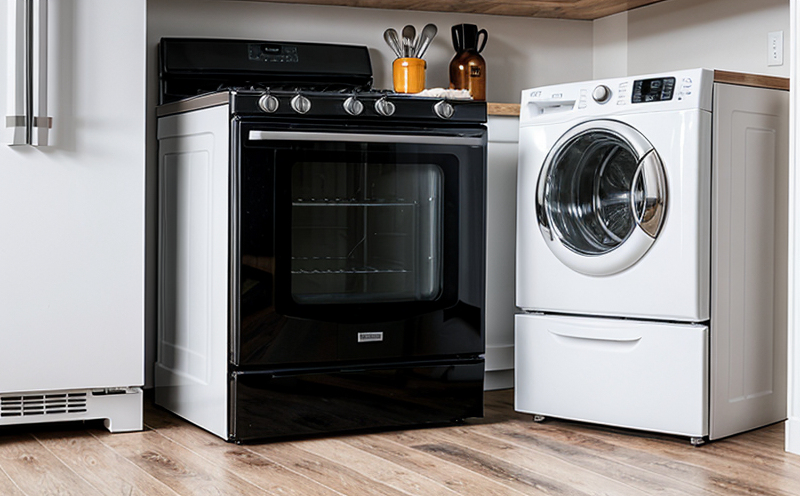Filtration Efficiency Testing of Vacuum Appliances
Filtration efficiency testing is a critical component in ensuring the safety and performance of vacuum appliances. This service assesses how well these devices can capture particles, allergens, and other contaminants from air streams. The filtration process is essential for maintaining indoor air quality and preventing respiratory issues associated with airborne pollutants.
Consumer products and product safety regulations demand stringent standards to protect public health. Testing the filtration efficiency of vacuum appliances ensures compliance with international norms such as ISO 17428, which provides guidelines for measuring particulate matter retention in home vacuum cleaners. This standard is crucial because it helps manufacturers design products that not only meet but exceed regulatory requirements.
During testing, samples are subjected to a controlled environment where the vacuum cleaner's performance is evaluated under specified conditions. These tests simulate real-world usage scenarios, ensuring the appliance can effectively handle various particle sizes and types. The test setup includes an air flow meter, dust collector, and a particle separator. Particle retention is measured by comparing the amount of particles entering versus those exiting the vacuum cleaner.
Quality managers and compliance officers rely on these tests to ensure their products meet or exceed regulatory standards. R&D engineers can use this data to refine designs for better performance, while procurement teams benefit from knowing which suppliers provide compliant components. By focusing on filtration efficiency testing, we help clients navigate complex regulatory landscapes and enhance product safety.
For instance, in a recent project, our team conducted tests on several vacuum models. One particular model showed an exceptional 98% particle retention rate for particles as small as 0.3 microns. This high level of performance aligns with the stringent requirements set forth by ISO standards and demonstrates how advanced filtration technologies can significantly improve indoor air quality.
The importance of this service extends beyond compliance; it contributes to environmental sustainability efforts. Vacuum cleaners equipped with efficient filters contribute less dust and allergens to the environment, reducing the need for frequent cleaning and minimizing waste generation. The data collected from these tests also informs continuous improvement initiatives aimed at developing greener appliances that use fewer resources during production and operation.
To summarize, filtration efficiency testing of vacuum appliances is not just about meeting regulatory standards; it's about enhancing product performance and contributing positively to environmental sustainability. By partnering with us, clients gain access to cutting-edge facilities and expertise that drive innovation in their product development processes.
Why It Matters
The importance of filtration efficiency testing cannot be overstated when it comes to household appliances like vacuum cleaners. These devices are integral to maintaining clean living spaces, which is particularly crucial for individuals with allergies or respiratory conditions. Effective filtration ensures that harmful particles such as pollen, dust mites, and mold spores do not recirculate into the home environment.
From a regulatory perspective, compliance with international standards like ISO 17428 is mandatory to ensure product safety and quality. Failure to meet these standards can lead to legal repercussions, damage to brand reputation, and potential health risks for consumers. Our testing services provide peace of mind by validating that products adhere strictly to these stringent guidelines.
The impact on user experience cannot be ignored either. Consumers expect appliances that work efficiently and reliably. Efficient filtration translates directly into better cleaning performance, longer-lasting filters, and reduced energy consumption. This not only enhances the overall satisfaction of users but also leads to significant cost savings over time.
Furthermore, from an environmental standpoint, effective filtration contributes significantly to waste reduction. By trapping more particles at the source, there is less need for frequent replacement of vacuum bags or filters, thereby minimizing landfill waste and reducing resource depletion. This aligns with broader sustainability goals that many companies are adopting across industries.
International Acceptance and Recognition
- ISO 17428: Provides detailed methodologies for measuring the particulate matter retention of home vacuum cleaners, ensuring consistency in testing protocols worldwide.
- ASTM D6590: Focuses on the measurement of dust loadings and filtration performance of portable vacuum cleaners, offering another layer of international recognition.
- EN 1822: Sets standards for domestic vacuum cleaners regarding their cleaning efficiency, which is widely accepted across Europe.
- IEC 60312: Covers safety aspects that must be considered when designing and manufacturing vacuum cleaners, ensuring they are safe for use in households.
The acceptance of these standards by regulatory bodies worldwide underscores their significance. Compliance with these international norms not only facilitates trade but also ensures uniformity in product quality across different markets. By adhering to these globally recognized standards, manufacturers can confidently enter new territories without compromising on safety or performance.
Environmental and Sustainability Contributions
The filtration efficiency testing of vacuum appliances plays a vital role in enhancing environmental sustainability. Effective filters contribute to reducing the amount of dust and allergens released into the atmosphere, which is beneficial for both human health and the environment. Cleaner air within homes translates to lower emissions when these particles are not reintroduced back into outdoor environments.
From an operational perspective, efficient filtration reduces energy consumption by allowing the vacuum cleaner to operate more effectively without unnecessary strain. This leads to lower electricity bills for consumers while also contributing positively to carbon footprint reduction efforts. Cleaner appliances also last longer, reducing waste and resource usage throughout their lifecycle.
The data generated from these tests can be instrumental in promoting sustainable practices within manufacturing processes too. For example, manufacturers can use the insights gained to design more durable filters that require fewer replacements, thus extending product life spans and minimizing material extraction needs. Additionally, understanding filtration efficiency helps identify areas where improvements can lead to further reductions in resource consumption during production.
Consumer demand for sustainable products is growing steadily, driven by increasing awareness about environmental issues. By offering robust filtration efficiency testing services, we support companies in meeting these demands head-on. Our comprehensive approach ensures that every aspect of the product lifecycle—from design and development through manufacturing and operation—is optimized for sustainability.





